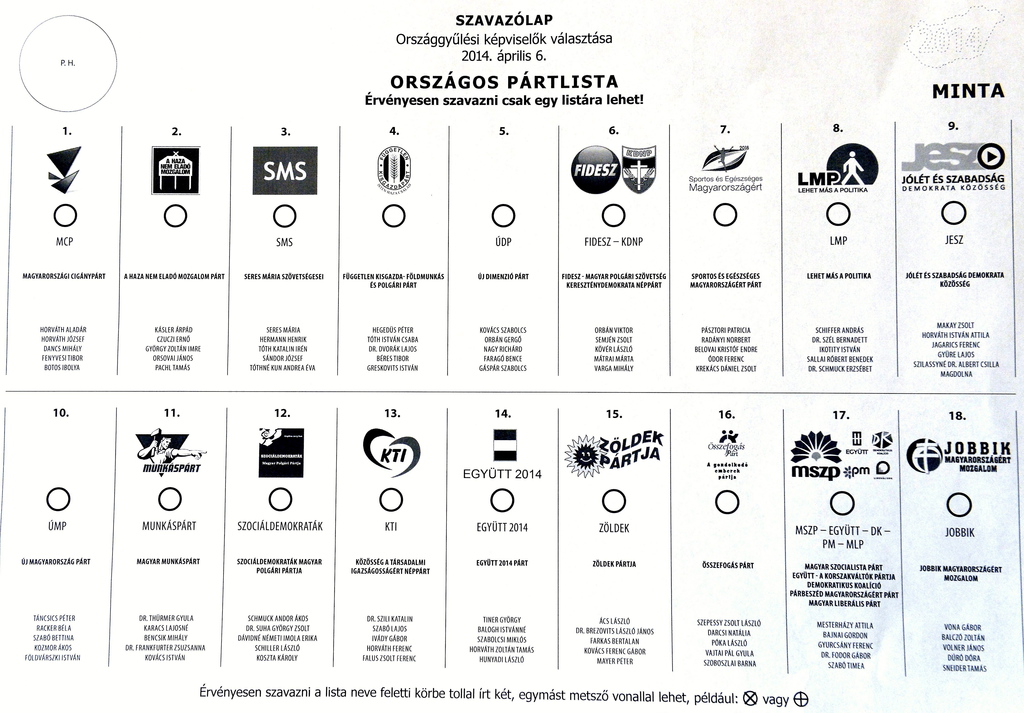Expert: New campaign system guarantees abuse

From the BBJ print edition: This year sees the introduction of a new election and campaign system that will also leave a profound mark. The changes have stirred up criticism and concerns amid suggestions that the system is flawed and encourages fraud and profiteering. The Budapest Business Journal asked Róbert László, election specialist at the think-tank Political Capital, to explain the issues.
BBJ: What are the most important aspects stemming from the changes in the election system?
László: The changes in the election system are extensive. Unfortunately, they didn’t fix the biggest problems. There are two main positive directions. One is that it put an end to the previous recommendation system, which had a black market of sorts surrounding it as the various parties bought and sold the slips to raise the amounts necessary to run.
The other main positive aspect is that it makes it easier to run. This is why political experts leaning towards the governing party often say that earlier everybody was upset because it was too difficult to run, now it’s much easier, so why is there a problem?
What is the problem?
The issue is that the system is still built up in a way in which political parties are managing citizens’ personal data, which is a guarantee that there will be abuses. The revision had the promise of putting an end to the bad habits of the previous setup, but that isn’t what happened -- far from it: One citizen may support multiple candidates entering contention, meaning one individual could support 10, 20, 30 or as many candidates as they want. This basically resulted in names and personal data being copied left and right without the signers having any idea their data is being used for such purposes.
The other key aspect is that the revised system also includes the motivation to violate the rules through new campaign financing.
But the financing system was changed with the very goal of legalizing campaign spending instead of the previous unrealistically low amounts that invariably called for rigging the books afterwards.
Yes, parties that can enter a candidate in every voting district can receive up to HUF 995 million for their campaign. This is a step in the right direction, because it is closer to the actual amounts they spend, but it’s still only half or a third of what actually gets spent on a campaign. At least this amount is a little closer to reality, but it also shows that despite the will to change, there was no real success in changing the things that are worst about the system.
For instance, individual candidates aren’t allowed to handle any cash, they get their state allowance through a treasury card system, which effectively filters out any abuse. This leaves the question as to why a similar approach couldn’t have been applied in the party list system, where far bigger sums are used and disappear forever. There was the clear opportunity, there was the clear solution, but it was ignored when finalizing the system.
What authorities can someone turn to if they want to file a complaint? Forging personal data in official documentation is, after all, a criminal act.
The election authorities predominantly handle all matters. However, as the head of the data protection authority Attila Péterfalvi has said, the official position of the authority is that going through all the recommendation sheets to filter out transgressions and to identify any signs of foul play would be too much work.
Furthermore, the controller’s jurisdiction laid out in law only extends to making sure that the personal information contained on the sheets is accurate. And since the data is copied from actual submissions, it is of course valid and there is no detectable violation. It’s a surefire deal; it’s impossible to get caught.
Is there any consensus about how many of the record number of entrants to the April vote are, let’s say, “bogus”?
No, there isn’t but it really depends on how we define “bogus.” Basically, any party that we’ve never heard of before, that emerged recently and doesn’t have the slightest chance of reaching the 5% parliamentary threshold can’t really be taken seriously. “Bogusness” definitely applies to the two parties linked to János Zuschlag, the Együtt 2014 who managed to raise a national list by hijacking Gordon Bajnai’s party brand, and [the Sportive and Healthy Hungary party], which a look at their website shows that it is fake.
If we apply stricter criteria, the parties led by Katalin Szili and Andor Schmuck, are also in the bogus category, given that they don’t have a chance of making it into the parliament. The case here is somewhat different only because these are more established politicians with a measurable professional history.
If someone wants to challenge perceived or actual animosities, where can they go if the regulatory environment favors or actually encourages fraudulent behavior this way?
It would require a change to the law, which is unlikely. In its current state, the abuse of the system isn’t just an accompanying occurrence; it is endemic to the system itself. The various parties can easily get the necessary support and then they don’t even have to give a proper account of how they spent the central campaign funding. If a party gets an invoice for spending HUF 100 million on flyers when they actually only spent HUF 1 million, the State Audit Office doesn’t have any means of investigating or knowing. That is a very tempting opportunity.
A suspicious setup
A small political party, the MOST movement, has filed criminal charges against five parties for political fraud. The criminal claim lodged just as the BBJ went to print says these groups have engaged in the cheating that is made all to easy by the current voting system, being put to practice for the first time in 2014.
Since the limitations to entering the political race have been greatly reduced thanks to the revised voting system created by the reigning Fidesz government, there will be 18 organizations that have raised national lists, more than in any previous Hungarian election.
Immediately, suspicions arose that the only reason these groups appeared on the scene, having never been part of national politics before, was because of the hefty campaign financing available from the state if they raise the necessary initial support.
The government has received criticism that it only created this structure to facilitate its own political goals since it makes an already fragmented opposition split into even more, even less threatening groupings. It rebuffed this idea by noting that the revised system is actually prompting political plurality by making it easier to run for a broader group of interests.
Changes...
The major changes to the previously extant election system are as follows.
• Parliament will only have 199 MPs, down from the 386 elected in 2010. As a result, parliament will henceforth convene in the lower house chamber, which has been refurbished to accommodate the revised number.
• One citizen can nominate as many candidates as he or she wishes, whereas earlier one person could only support one candidate.
• Parties entering candidates in all constituencies can have a maximum state support of HUF 995 million, compared to HUF 386 million before.
• In several locations, residents will have to go to a new location to vote on April 6 after constituency borders were revised.
• There will only be one round of voting for party lists and individual candidates. The earlier system had two rounds separated by two weeks.
• Voter registration won’t yet be applied in 2014, but the governing Fidesz party says it still intends to introduce the provision despite international protests.
SUPPORT THE BUDAPEST BUSINESS JOURNAL
Producing journalism that is worthy of the name is a costly business. For 27 years, the publishers, editors and reporters of the Budapest Business Journal have striven to bring you business news that works, information that you can trust, that is factual, accurate and presented without fear or favor.
Newspaper organizations across the globe have struggled to find a business model that allows them to continue to excel, without compromising their ability to perform. Most recently, some have experimented with the idea of involving their most important stakeholders, their readers.
We would like to offer that same opportunity to our readers. We would like to invite you to help us deliver the quality business journalism you require. Hit our Support the BBJ button and you can choose the how much and how often you send us your contributions.








